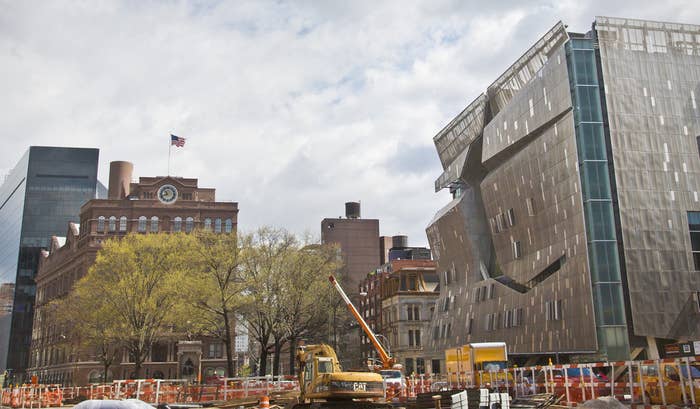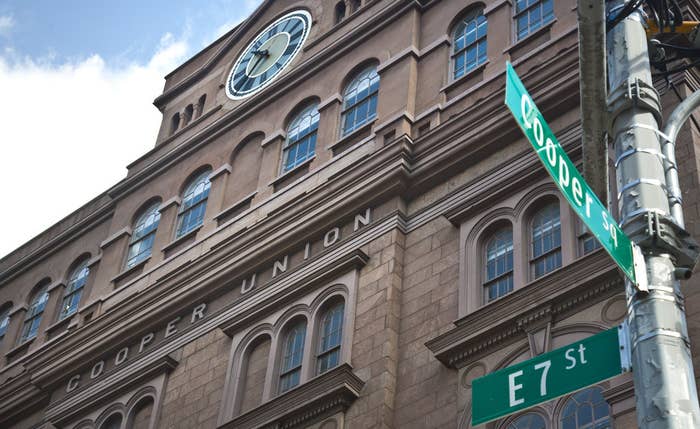
A scathing petition from the New York attorney general has provided a remarkable behind-the-scenes look at the financial management of a prestigious university — information normally shielded from the public eye.
The report faults the former leaders of Cooper Union, which was one of America's only universities that did not charge tuition fees, for a cascade of poor financial decisions, conflicts of interest, and mismanagement that plunged the school into financial ruin — forcing it, for the first time, to begin charging tuition.
The report "is unprecedented," said James Finkelstein, a professor of public policy at George Mason University. "This should be required reading for every board member, every chief financial officer, every university president in the country."
The report raises broader issues of transparency and accountability among nonprofit universities. In the pursuit of prestige, growth and financial strength, many other schools have done the same kind of things that the attorney general alleges so badly damaged Cooper Union — embarking on ambitious real estate projects, attempts to boost enrollment and revenue, and unusual executive compensation schemes.
Schneiderman's petition alleged that Cooper Union's former president, George Campbell, was caught in a "conflict of interest" over the real estate investments that proved devastating to the school's finances. Offered a hefty $350,000 bonus if he was able to construct a new academic building and lease another property, the attorney general said, Campbell pushed through the deals, even as the school struggled to raise the funds needed for them.
Though it has just 1,000 students, Cooper Union had long held a unique place in American higher education, especially in an era of skyrocketing student debt. It was the best-known, and most prestigious, of a tiny handful of colleges that are entirely free. But that ended in 2013, when the university, in dire financial straits, announced that it had no choice but to begin to charge tuition.
The Cooper Union report "highlights a serious problem with nonprofit governance," said Victor Fleisher, a law professor at the University of California San Diego. "Unlike privately held corporations, where shareholders often get involved in trying to make sure the board is adequately overseeing what goes on, there’s no mechanism for the stakeholders of a nonprofit to get involved in the same way."
"As members of the public and as stakeholders int these great institutions, we need to put more pressure on boards to be forthcoming with information, especially about their financial prospects," Fleisher said.
The roots of Cooper Union's crisis, Attorney General Eric Schneiderman said yesterday, were poor financial decisions by a decade of administrators at the Manhattan college.
The university's board, Schneiderman said, entered into high-stakes real estate deals with "no analysis of risk." The plans hinged, the report said, on the success of four key assumptions about the financial markets and the school's ability to cut costs. All four failed. With Cooper Union's finances floundering as a result, the attorney general found, the university's board misled donors and the public for years.
In a filing, Cooper Union and its board said they "neither accept nor agree" with the attorney general's investigative findings. "In addition to being incorrect and incomplete in numerous respects, they fail to credit the Board's commitment and initiative" in fixing Cooper Union's problems, the filing said. Cooper Union said it had acted in good faith and taken steps to fix governance problems.

Bad management decisions surrounding the school's real estate plan were compounded by the effects of the financial crisis. "When the stock market collapsed in late 2008, the damage already promised by the plan’s failure was greatly magnified, and transformed the entire project into an albatross," the petition alleges. "The new building was finished, but the school’s finances were broken in the process."
With the university in deep financial distress, the report said, Cooper Union's administration tried to generate new revenue by creating a new academic program, computer science, a considerable feat at a school that had traditionally offered only a handful of degrees. But "weaknesses in oversight management" led to that program's failure, according to the report.
Ryan Craig, the managing director of the investment firm University Ventures and author of a new book on higher education, said he expects increasing attention towards the structure and finances of large nonprofits like NYU.
"Large nonprofit universities like NYU, Boston University, the University of Southern California act in a corporate manner," Craig said. "You see it in terms of their development, their new programs, new products, their real estate facilities, their pricing. And in that regard, not materially distinct from how the for-profit universities operate."
Toby Cumberbatch, an engineering professor at Cooper Union and a longtime critic of the administration, highlighted the links between problems at Cooper Union and broader trends at prestigious American universities.
"We see what's happening at NYU and across the country in higher education now as exactly what was going on for a long time at Cooper," he said. "It's about student payments being used to run a corporation that benefits a few people to the extreme and hurts the institution."
Cooper Union's faculty and students were part of a larger protest Tuesday in Washington Square Park, where they stood alongside stakeholders at NYU and the New School to decry the "ruinous financial practices" of the three universities. NYU is on the precipice of its own major construction project in Greenwich Village, the neighborhood it shares with Cooper Union, for which it is expected to incur heavy debt.
